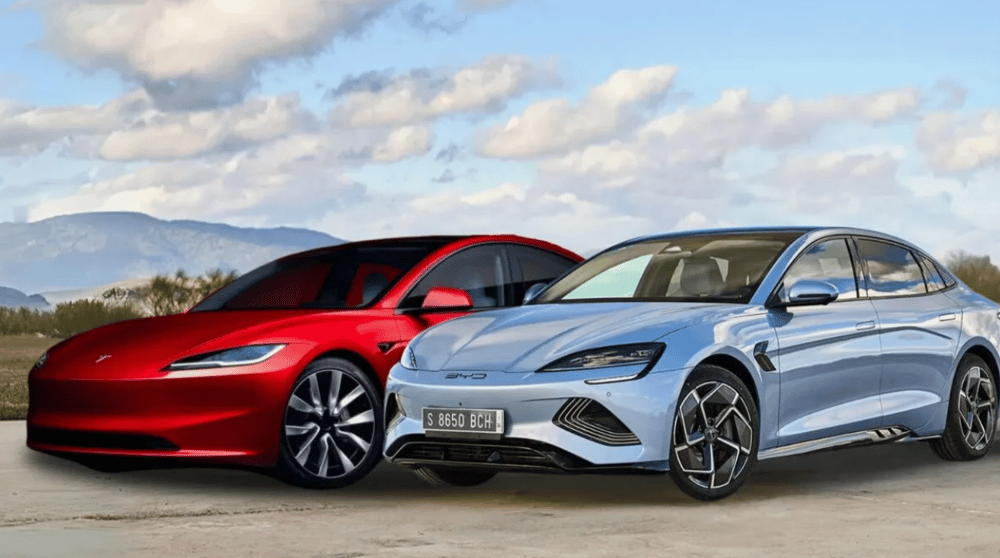BYD Undercuts Tesla in China’s Smart EV Race with Free Self-Driving Tech, Pressuring USD-EV Sector
China’s electric vehicle (EV) sector is entering a new phase of global competitiveness, as domestic automakers such as BYD Co. Ltd. accelerate their push into autonomous driving. Once narrowly trailing U.S. rivals in innovation, these companies are now redefining the battlefield by combining affordability with advanced technology. BYD’s recent decision to offer its “God’s Eye” driver-assistance system free of charge in China marks a pivotal moment in this shift—directly challenging Tesla’s $TSLA premium pricing strategy and setting the stage for a broader reconfiguration of the autonomous vehicle market.
BYD Challenges Tesla's Pricing Model, Redefines Autonomous Value Proposition
Tesla’s Full Self-Driving (FSD) package in China, priced at roughly $9,000 USD, has long stood as a benchmark for cutting-edge driver-assistance features in the EV market. However, BYD's move to provide a competing package at no additional cost repositions the value proposition for Chinese consumers and, potentially, global buyers.
The “God’s Eye” system integrates real-time navigation, adaptive cruise control, lane-keeping assist, and intelligent parking. While it doesn’t offer full Level 4 autonomy, it provides advanced Level 2+ capabilities—enough to meet current regulatory thresholds in China and most international markets. This aggressive pricing strategy not only undercuts Tesla but also puts pressure on other Chinese EV innovators such as XPeng $XPEV, NIO $NIO, and Li Auto $LI, all of whom are pursuing premiumization strategies.
The decision could have wide-reaching implications: from shifting consumer expectations to disrupting the economics of EV software subscriptions, which are increasingly viewed by Western automakers as high-margin revenue streams denominated in USD.

Key Developments — Market Context in Brief
BYD offers “God’s Eye” ADAS for free in new EV models.
Tesla’s FSD remains priced near $9,000 in China.
China now leads global EV shipments and autonomous miles tested.
XPeng and NIO remain focused on premium tech rollouts.
EV software monetization models face disruption from free ADAS offerings.
Continued Analysis — Market Response and Strategic Commentary
The global auto and tech investment communities have responded with keen interest. Analysts at Morgan Stanley $MS and HSBC $HSBA.L have noted that BYD’s strategy could force Tesla and other Western OEMs to reevaluate their monetization of autonomy-related features. While Tesla maintains brand loyalty and software superiority in several key international markets, its pricing model appears increasingly vulnerable in the price-sensitive, high-tech Chinese market.
In financial markets, TSLA shares have faced intermittent pressure as analysts weigh competitive threats from China’s state-supported EV ecosystem. Meanwhile, the Chinese yuan (CNY) has remained relatively stable, supported in part by continued EV exports—a bright spot in the nation’s otherwise slowing industrial output.
The broader question is whether this pricing shock will ripple into European and North American EV markets. If Chinese EV firms export models bundled with advanced ADAS for free or at very low cost, traditional automakers like Ford $F, General Motors $GM, and Volkswagen $VOW3.DE could be forced to slash prices or rethink product positioning entirely.

Strategic Takeaways — Key Points to Watch
Autonomous Driving as a Differentiator: BYD is redefining consumer expectations by removing price as a barrier to advanced driver-assistance systems.
Tesla’s Margin Risk: The FSD premium model may become unsustainable in markets influenced by Chinese competition.
Consumer Behavior Shift: Chinese buyers increasingly expect advanced tech as a default, not a luxury.
Regulatory Leverage: China’s supportive policy environment enables faster deployment of near-autonomous tech.
Export Disruption Potential: Chinese EV makers may export affordability and ADAS simultaneously, putting global OEMs under pressure.
China’s Tech Strategy Forces Recalibration of Global EV Market Dynamics
BYD’s decision to provide its “God’s Eye” ADAS suite free of charge represents more than a pricing gimmick—it is a strategic pivot that could alter the economics of autonomous vehicle deployment globally. As Tesla and its Western peers lean into software subscription models to drive revenue, Chinese automakers are betting that scale, not software pricing, will dictate market dominance.
This divergence in approach highlights a larger geopolitical and industrial transformation: China is not just catching up in smart-EV technology—it’s reshaping the rules. For markets, regulators, and consumers alike, the implications are far-reaching and likely to define the competitive landscape for years to come.















Comments